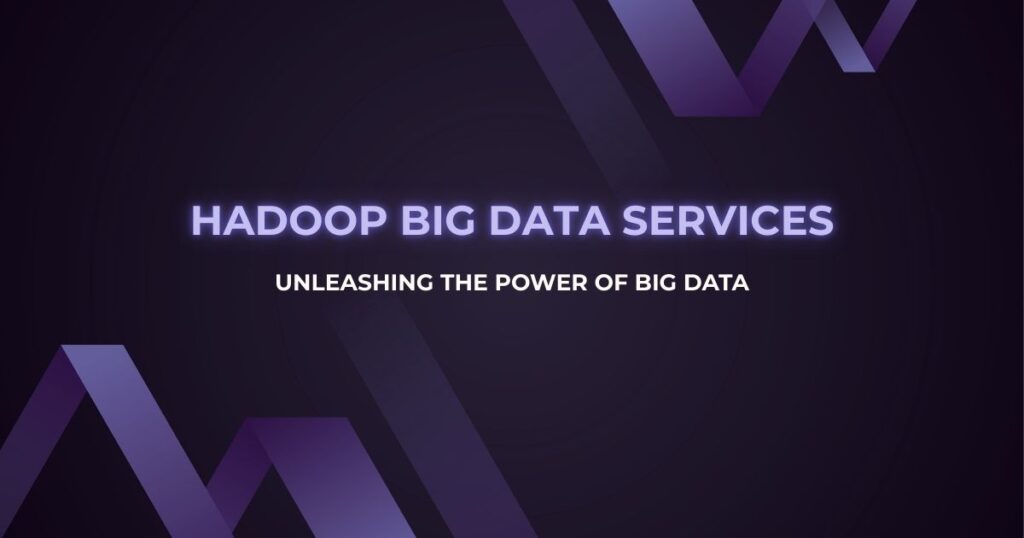Big Data is no longer a buzzword—it’s the backbone of modern business intelligence. And when it comes to managing vast oceans of data, Hadoop Big Data Services are your most reliable lifeline. Whether you’re running a startup or a global enterprise, understanding how Hadoop transforms your data landscape is crucial. In this guide, we’re diving deep into the world of Hadoop—from what it is, how it works, to why it’s a must-have for your data strategy.
What is Hadoop?
Let’s start at the beginning. Hadoop is an open-source framework designed to store and process large volumes of data across distributed computing environments. It’s not just fast—it’s scalable, fault-tolerant, and cost-effective. Developed by the Apache Software Foundation, Hadoop lets you handle data from multiple sources and formats with ease.
Why Hadoop is a Game-Changer in Big Data
Imagine trying to drink water from a firehose—that’s how overwhelming big data can be without the right tools. Hadoop steps in as your precision-engineered filter. It breaks data into manageable pieces, processes them in parallel, and gives you valuable insights faster than traditional systems.
Core Components of Hadoop
1. Hadoop Distributed File System (HDFS)
HDFS is like the brain of Hadoop’s storage. It stores data in chunks and distributes them across various machines. What’s cool? Even if one node fails, the data remains safe and accessible.
2. MapReduce
This is the processing engine of Hadoop. It handles tasks in two steps: Map (data is split and processed) and Reduce (results are aggregated). Think of it as a team of chefs working on separate parts of a meal and then bringing it all together for a perfect dish.
3. YARN (Yet Another Resource Negotiator)
YARN is the traffic cop of the system. It manages and allocates resources across the cluster, ensuring that everything runs smoothly without gridlock.
4. Hadoop Common
This is the set of shared utilities that support the modules. It’s like the toolbox that every Hadoop component uses.
Types of Hadoop Big Data Services
1. Managed Hadoop Services
Cloud providers like AWS (EMR), Microsoft Azure (HDInsight), and Google Cloud offer fully managed Hadoop services. You get all the benefits of Hadoop without the headache of maintenance.
2. Hadoop Consulting Services
Experts help you assess, plan, and implement Hadoop in your business environment. Great for companies starting their big data journey.
3. Hadoop Development Services
Custom solutions are built using Hadoop’s framework to match your specific use cases—be it predictive analytics, customer segmentation, or fraud detection.
4. Hadoop Support and Maintenance
After setup, these services ensure your Hadoop ecosystem remains stable, secure, and efficient.
How Hadoop Handles Structured vs. Unstructured Data
In today’s data-driven world, businesses collect data from a variety of sources—emails, social media, customer transactions, sensor logs—you name it. Hadoop can process both structured (like spreadsheets) and unstructured (like videos or tweets) data with equal ease.
Use Cases of Hadoop Big Data Services
1. Retail and E-commerce
Retailers use Hadoop to track customer behavior, manage inventory, and personalize shopping experiences.
2. Healthcare
Hospitals analyze massive amounts of patient data to improve diagnoses and treatment plans.
3. Banking and Finance
Hadoop helps in real-time fraud detection, customer credit scoring, and regulatory compliance.
4. Manufacturing
Predictive maintenance, quality assurance, and supply chain optimization all benefit from Hadoop’s analytics.
5. Media and Entertainment
Streaming platforms use Hadoop to analyze viewer habits and optimize content recommendations.
Benefits of Hadoop Big Data Services
1. Scalability
Add more nodes on the fly—Hadoop grows with your data.
2. Cost-Effectiveness
Being open-source and hardware-independent, it significantly lowers the total cost of ownership.
3. Speed
Parallel processing = lightning-fast analytics.
4. Flexibility
Supports different data types and works well with other big data tools.
5. Fault Tolerance
Data is automatically replicated—no more sleepless nights over server crashes.
Challenges in Implementing Hadoop
Let’s keep it real—Hadoop isn’t a plug-and-play solution.
-
Steep Learning Curve: The system can be complex for teams new to big data.
-
Security Risks: Open-source can mean vulnerabilities if not properly secured.
-
Data Governance: Without solid planning, things can quickly become chaotic.
-
Resource Management: Requires careful tuning for optimal performance.
Hadoop vs. Other Big Data Technologies
When compared with platforms like Apache Spark or Snowflake, Hadoop holds its own, especially in storage and batch processing. However, Spark may outperform Hadoop in real-time data analytics due to its in-memory computing.
Integrating Hadoop with Other Tools
Hadoop isn’t a solo act. It often works alongside tools like:
-
Hive for SQL-based querying
-
Pig for analyzing large datasets
-
HBase for real-time data access
-
Flume & Sqoop for data ingestion
It’s like building an all-star team where every tool plays a key role.
Hadoop in the Cloud: A Smart Move?
Absolutely. Cloud-based Hadoop services offer scalability, lower infrastructure costs, and faster deployment. Platforms like Amazon EMR and Azure HDInsight handle the heavy lifting, letting you focus on insights, not infrastructure.
Future Trends in Hadoop Big Data Services
-
AI and ML Integration: Smarter data models
-
Real-Time Analytics: From hours to milliseconds
-
Edge Computing: Bringing processing closer to data sources
-
Data-as-a-Service (DaaS): Selling insights, not just storing data
The Hadoop ecosystem continues to evolve, and its role in enabling advanced analytics is only going to expand.
How to Choose the Right Hadoop Big Data Service Provider
Here’s a quick checklist:
-
Do they offer end-to-end support?
-
Are they experienced in your industry?
-
What kind of SLAs and uptime guarantees do they provide?
-
Do they offer training and documentation?
-
Is their pricing transparent?
Choose wisely—your data deserves the best.
Conclusion
Hadoop Big Data Services have revolutionized the way we collect, store, process, and analyze data. They empower businesses to dig deeper, think smarter, and act faster. Whether you’re an enterprise looking to optimize workflows or a startup aiming to disrupt the market, Hadoop is the secret sauce you need to scale new heights in the data-driven age.
FAQs
1. What are Hadoop Big Data Services?
These are professional services focused on implementing, managing, and optimizing the Hadoop ecosystem to handle big data workloads.
2. Is Hadoop still relevant in 2025?
Yes! Despite newer technologies, Hadoop remains critical for batch processing and large-scale data storage.
3. Can small businesses benefit from Hadoop?
Absolutely. Managed Hadoop services allow even small businesses to leverage big data without heavy investment.
4. How secure is Hadoop?
With the right configurations and tools (like Kerberos and Ranger), Hadoop can be extremely secure.
5. What’s the difference between Hadoop and Spark?
Hadoop is great for batch processing and storage, while Spark is faster for real-time analytics due to in-memory processing.
- Hadoop Big Data Services: Unleashing the Power of Big Data
- Explore how Hadoop Big Data Services empower businesses to manage and analyze large datasets efficiently. Discover its components, benefits, real-world use cases, and why it's still a top choice in the evolving big data landscape.
- #Hadoop, #BigData, #DataAnalytics, #ApacheHadoop, #BigDataServices, #DataEngineering, #CloudAnalytics, #DataScience, #BusinessIntelligence, #HadoopServices
Related posts:
 Why KBH Games Is Perfect for Family-Friendly Online Entertainment
Why KBH Games Is Perfect for Family-Friendly Online Entertainment
 High-Quality Biomedical Waste Incinerators & Laboratory Glassware Made in India
High-Quality Biomedical Waste Incinerators & Laboratory Glassware Made in India
 Understanding the Role of IoT in Modern Manufacturing: A Comprehensive Guide to Smart Factories and Industrial Transformation
Understanding the Role of IoT in Modern Manufacturing: A Comprehensive Guide to Smart Factories and Industrial Transformation
 Best Account Management Software for All Businesses – EmizenTech
Best Account Management Software for All Businesses – EmizenTech
 Top 15 Global Website Design Companies You Can Hire in the 2025
Top 15 Global Website Design Companies You Can Hire in the 2025
 Unlocking Customer Insights with Video Analytics in Retail Industry
Unlocking Customer Insights with Video Analytics in Retail Industry
 Empowering Qatari Retail Businesses with Microsoft Dynamics 365 Commerce
Empowering Qatari Retail Businesses with Microsoft Dynamics 365 Commerce
 Low Voltage Solutions for Commercial Developers – SecureTech Systems
Low Voltage Solutions for Commercial Developers – SecureTech Systems







